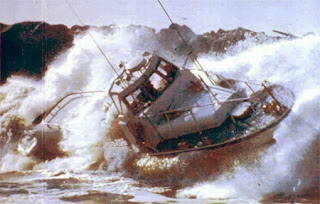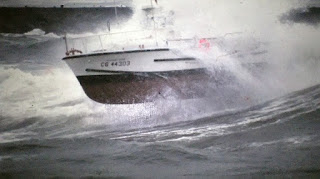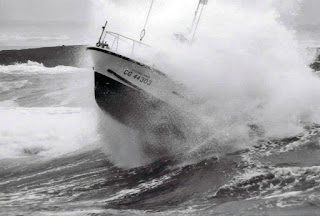Located in a picturesque harbor community with the unlikely name of Winchester Bay, this seemingly insignificant Oregon coastal town became perhaps the most significant influence of my young adult life. It was here life-maturing adventures, some routine, some filled with deadly drama, unfolded around me. January 20, 1974, barely two months after my arrival, one of the most dramatic events to challenge our small crew exploded into life. It was an event that helped to define who we were as Wave Warriors. It was an event that very nearly cost the lives of three men and one that brought into focus just how quickly events could turn from routine, to life threatening.
I hovered between being alert and drifting off, hanging on as best as I could to what was happening around me as I struggled in a sleep deprived state. Having been awake since before 3:30 am, I struggled to remain awake on this dreary and rainy, but otherwise uneventful morning. My lookout tower watch relief arrived at 8:00 am snapping me back into a more awake mode. A few moments later my crew mate stepped through the back door and shook his arms and shoulders to release some of the accumulated rain from his coat.
"Nasty cold this morning." He murmured half aloud as he removed his olive green field jacket.
"Not much happening...looks like four trawlers several miles north of the bar working their way south. Probably the Midnight Sun, and maybe the Harmony...can't tell who the other two are. The bar is starting to close up, looks like ten to twelve foot breakers forming along the north spit, but the channel is still open." I said with a yawn.
He raised a pair of binoculars from the table and swung them toward the north. "Yeah, I see them. By the way, we need to swap out the small craft advisory flag to Gale warnings," he said as he handed me a Group Office weather notification. "Weather report says a big blow is coming this way. Probably end up running a storm warning flag up later today."
I reached into the bottom desk drawer and extracted another deep red, long, triangle flag. Its musty, damp aroma at once filled the room as it partially unrolled as I held it. Its tattered, pointed end touched the floor. A single triangle flag, which was already flying, indicated a small craft wind advisory, two flying in tandem was a Gale warning.
"I'll run this up on my way out."
The wind was already much stiffer and colder and bit into my face like stinging nettles. My eyes watered as I struggled to attach the new flag to the lanyard with numb, wet hands, but, I eventually secured it and ran the tandem signals to the top of the mast where they popped and snapped in a fast paced, wind stiffened dance. I stood for a moment and surveyed the scene stretched out in front of and below me. From my vantage point high on the ridge, for as far as I could see north or south the Oregon coast sand dunes rolled along the edge of the continent until they faded into the mist. Long rows of white breakers outlined the terminal edge and the ocean, accented in a sickly grey embrace spit and slapped with white caps churned by the northerly tempest. Although still rather inexperienced I sensed something ominous was in the air, I could feel it.
I tossed a quick wave toward the lookout building and climbed into my car. A few minutes later I was enjoying a breakfast of fresh eggs and toast back at the station before I had to turn to. Morning quarters was already over and everyone was starting their work assignments. Just coming off the morning watch, I could linger a bit longer eating my breakfast before joining them. The day seemed rather ordinary.
About mid-morning, Chief Whalen, our commanding officer, used the intercom.
"BM1 Bauer, Seaman Brazy, and EN McKean report to the outer office."
I just happened to be wandering through that area when the announcement came. Within a minute all three of them were standing inside the communications room. BM1 Wayne Bauer, who was a twelve year veteran and one of the best boat coxswains in the entire group Coos Bay, was talking to Chief Whalen. I stopped momentarily in the doorway to see what was going on.
Chief Whalen, using his deep voice and deeper scowl, told Wayne, "That storm is closing in pretty fast and it looks like the bar is turning ugly. Tower watch indicates 12 to 15 foot breakers across the entire bar, we can expect 20 footers when things get to blowing. Those trawlers out there are wanting to get inside before this storm really kicks off, but with the bar like it is, they are requesting we provide a stand-by escort inside the bar as they come across."
Wayne, without hesitation, motioned to Dan McKean to light off the 44331, one of our 44 foot motor lifeboats. He quickly trotted out of the room and across the connecting gangplank to the boathouse. A moment later the staccato rumble of the 331's powerful Cummins diesel engines came to life.
Wayne and Ed Brazy started to leave the office when a new friend of mine, David Mobley stepped into the room. David was new to the station and needed some experience on Bar Patrols. Wayne, always ready to give younger less experienced personnel some training time, motioned his arm toward David.
"Mobes...come on, you're with us on this one." The normal crew for a 44 was three, but sometimes four was used depending on the circumstances.
Chief Whalen waved me over. "As soon as the 331 one gets on station, grab a couple guys and take the station truck down to the first parking area. Take a radio and standby on the back of the jetty just in case we might need someone down there on the beach."
I grabbed a couple other crewman and asked them if they wanted to be part of the shore crew. "Hell yeah." they said in unison. "Okay, then, we shove off in maybe ten or fifteen minutes."
I grabbed a portable transceiver from its recharging station in the comm room and turned it on switching the frequency to monitor the ship to shore frequency used by the 331 to communicate with the station and the trawlers. Within a minute the 331 idled out of the boathouse. Once they were clear Wayne transmitted, "Station Umpqua River...331 underway," and he pressed the throttles forward. The 331 was a magnificent surf boat and she responded accordingly by digging her flanks deeper into the channel as she rounded the exist channel into the river.
A few moments later, "Station Umpqua River, Midnight Sun here...come back, Over."
The com-watch lifted the microphone and replied, "Ah roger Midnight Sun...Station Umpqua River."
"Yeah, looks like the bar is closed up. It's getting a bit rough out here and things will most likely get rougher trying to cross over. We have four vessels out here and we all want to get inside the bar while we still can. What's the status on the escort?"
Before the Com-watch could reply, Wayne from the 331 answered. "Midnight Sun, this is CG44331. We're underway at this time and will be on location in approximately ten minutes. We'll standby inside the main channel. Just let us know when you're ready to cross over."
A minute or two later myself and two other crewmen were speeding over to the jetty. We arrived just about the same time as the 331 arrived on station just inside the bar. We trudged across the sand dunes fighting the wind and the cold spitting rain to eventually stand atop the back end of the jetty. The large black rocks extended nearly a quarter mile out from the beach, but from our vantage point we could barely see the end of it in the wind generated mist blowing off the ocean.
"Midnight Sun...this is the 331. We're standing by about 75 yards inside the bar. The tower says the channel lays down for a minute or two after four or five breaker series. If you time it right you should make it across on those lay downs without any problems."
"331...Midnight Sun here. Yeah, we've been watching it. Standby. We're making our run after the next series."
One by one over the next thirty minutes or so each of the larger trawlers waited their turn to run across. The skippers of those trawlers were highly experienced and capable operators and knew what they were doing. As they crossed over and passed by the 331, they all gave a wave of thanks. The last trawler to come across was the Holmes, a small double-end trawler, about thirty feet long, with a crew of three on board; two older adults and a young teenage boy. By this time the breakers across the bar were beginning to grow in size and power. More importantly, they became less predicable.
The Holmes sat outside the bar waiting for the anticipated lay down and when the timing seemed right, she started her run. She was much smaller than and not nearly as fast as the other vessels and being heavy laden, could not accelerate very well. As she approached the most critical point in the crossing, a large swell rose up behind and overtook her causing the vessel to begin to broach to one side as the rear end started moving faster than the front end. The skipper skillfully compensated by throttling back allowing the swell to pass underneath them and the Holmes rolled softly into the trough behind the swell. As he worked the throttles forward again trying to ride the swell across the bar, a large breaker rose up and began to bear down on them. It all happened so quickly, there was nothing the skipper could do to avoid the collision, and the breaker, approximately 15 feet in height, crested over their stern and exploded with tons of force onto the deck.
The force of the collison caused her to broach to her port side and she almost rolled, but righted herself, however, tons of water flooded into the engine room causing the engine to stall. They lost all steering and power as the bar began to renew its strength and a new and deadly series of breakers began to crash down on them. The force of the northwesterly swells shoved them toward the south side of the jetty. Her screws and rudder were mangled as the vessel was lifted and slammed onto some of the submerged rocks that extended out from the end of the jetty. She spun out of control, rolling from side to side with her gunwales catching water with each roll. More water poured into her hull and she sank lower.
Wayne and his crew jumped into action and he threw the throttles of the 331 into gear causing the motor lifeboat to lunge forward toward the breaker line. I, and the other two shore crewman, started running down the jetty. It was long and difficult task as we had to leap from boulder to boulder, often slipping and falling on the wet surfaces. There really wasn't much we could do, but we needed to be as close to the action as we could just in case someone went into the water.
"Keep an eye them!" Wayne shouted as he approached the first breaker line. Within seconds the bow of the 331 rose across the face of a breaker and exploded into the air momentarily hanging suspended between sky and ocean. A second later the bow arched over and plunged into the trough sending a giant spray of foaming water to both sides. A second and third time the 331 powered its way through the layers of breakers. Wayne worked the wheel right then left, throttled back then applied full power to maneuver the 331 through a traitorous series of breakers. Finally, they broke free of the line. The Holmes by this time had drifted well to the south side of the jetty hovering ever closer to the dooming rocks. She was tossed like a twig, helpless and alone. Wayne and his crew, then had to circle back through the breakers to approach the Holmes. They reentered the break line using the throttles and rudder to ride over and across the breakers. More than once a breaker exploded over the stern shoving them onto a 90 degree roll nearly tipping them all the way over. The 44's were designed to take a 360 degree roll and keep going, but the idea was to avoid such a thing. Wayne performed brilliantly as he maintained control of the 44.
"We'll never get a line on her to tow her out, we'll have to get the crew off when I pull along side. One or two chances at best before she goes up on the rocks. Standby...stand ready...here we go."
Wayne powered the 331 across another break line toward the Holmes, riding high, then low, spinning the wheel and working the throttles to keep her under control. A few yards from the floundering vessel, he spun the bow and fishtailed the stern and starboard side of the 331 into the side of the Holmes exchanging paint for position. His crew standing in the lower well and along the side of the 331 shouted frantically motioning for the three men to abandon their vessel and jump over to the 331. The two adults made a quick decision to do so, and managed to leap across falling prostrate into the lower well deck where David helped secure them. The teenage boy started to follow them then panicked and hesitated.
Ed Brazy who was standing on the footing that ran along the rear compartment, held onto a handrail with one hand and waved for the teenager to come on with the other. By this time I was standing on the jetty directly across and above from where all the action was taking place and I watched in fascination as this dramatic event unfolded. My vantage point was probably no more than 50 feet from the Holmes. Large breakers were exploding all around us leaping into the air to throw white foaming spray into our faces, rolling up and along the jetty, slamming into the Holmes causing her to roll and sway dangerously port to starboard almost capsizing her as she took on more and more water.
I heard Wayne shout above the roar of the surf, "Breaker!" and he was forced to pull away from the Holmes. At the same time Ed managed to get the teenager to let go of his panicked grip and move toward him. When he saw that Wayne was going to pull away, he grabbed the kid with his free arm hauling him across the narrow gap between the boats and slammed him against the rear compartment pinning him down. Wayne pulled away just as another 15 maybe even 20 foot breaker slammed into them. The 331 was rocked by its power, rolled heavily to starboard, but she did what she was designed to do and plowed through the breaker. Wayne, then knowing that all three of the Holmes crew were now aboard, again forced the 331 back through the breakers and out to clear water.
Within a few seconds after Wayne pulled away, a giant swell lifted the Holmes and slammed her onto the rocks. Her wooden hull splintered and cracked with a sickening agony, and just as quickly, she melted into the surf a few yards from where I stood.
I hung there staring at the debris that continued to float near the jetty, awestruck by the dramatic events that played out in front of me. It all seemed to play out like the fog of battle. For the next thirty minutes I watched as the 331 circled around the jetty far enough out from the breaker line to avoid any trouble waiting for the main channel to lay down, then he shot the 331 across and headed in. All of us were exhausted.
As I made my way back toward the truck I contemplated what had just happened. These three men would have died that day had it not been for the skill and bravery of the crew on the CG44331. My roll in all of this was minimal, yet somehow I understood that by simply witnessing this event I had been changed. For the first time I realized that my service here at the Umpqua River Station had a deeper meaning and I was a part of something much larger than what I expected. I knew I must always be ready in the face of uncertainty and danger.
Wayne and his crew received commendations for their efforts rescuing the crew of the Holmes. The memory of this event became a part of my history, a part of who I was, and who I was to become.












